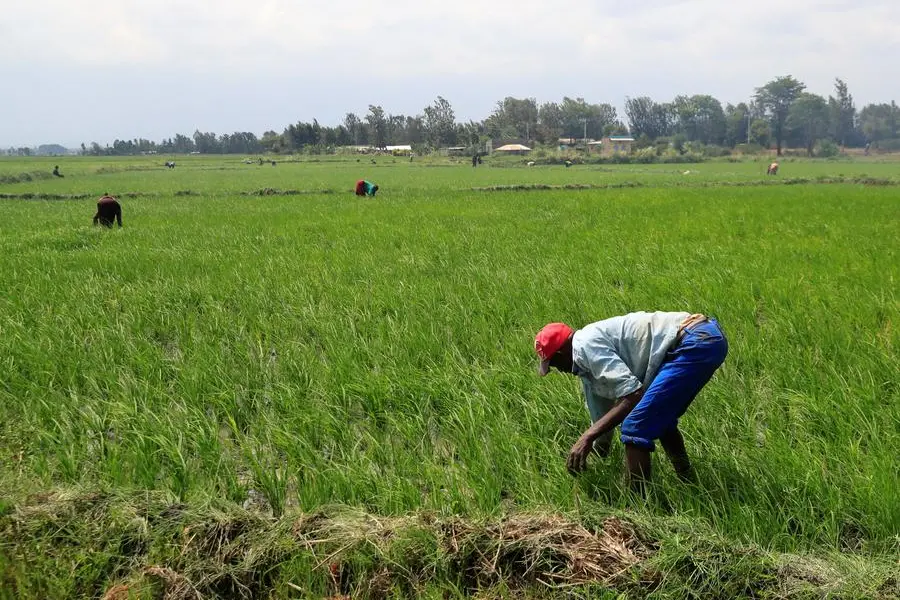PHOTO
African countries are headed to miss their own target of reducing hunger through better agricultural investments.
The revelations emerged on Monday at a meeting of the African Union meant to evaluate Africa’s path to towards better nutrition and eradication of extreme hunger.
Read: Paradox of feeding Africa’s starving millionsAnd it emerged just four Member States are on track to deliver key nutrition targets, just two years to the deadline agreed on it the Malabo Declaration on Accelerated Agricultural Growth and Transformation for Shared Prosperity and Improved Livelihoods.
The 2014 declaration reached in the Equatorial Guinean capital by the AU Head of State was aimed at providing effective leadership for the attainments of specific goals on ending extreme hunger, improving nutrition, tripling inter- African trade in the Agricultural sector as well as boosting resilience against climate risks.
At the event organised by the African Union InterAfrican Bureau for Animal Resources (AU-IBAR) and the Bill and Melinda Gates Foundation at Naivasha hotel, participants were told of imminent ramifications: prolonged poverty.“It is now imperative that we prepare to account for how the livestock sector has contributed to delivering against key targets,” said Dr Nick Nwankpa, the African Union-InterAfrican Bureau for Animal Resources (AU-IBAR) Acting Director.
Malabo Declaration is supposed to end by 2025. Incidentally, it is also the mid-way point of implementation of the Livestock Development Strategy for Africa (LiDeSA), a continental vision to tap into the value of livestock as a key source of food, ending poverty.
But the continent has suffered more droughts, more floods, more pest invasion and lower food production, also owing to global events such as Covid-19 and the Russian invasion of Ukraine.
The AU-IBAR Resilient African Feed and Fodder Systems Project proposes strengthening what he called “evidence-based decision making” and attracting investment, identifying and up-scaling viable existing approaches in addressing the crisis.“The multiplicity and increasing frequency and severity of shocks and their complex and interlocking effects demands an approach that will also strengthen resilience in feed and fodder systems,” Dr Nwankpa said.
Kenya, for instance needs 55 million metric tonnes of dried feed, annually, according to Ministry of Agriculture official, Dr Stanley Mutua.
Read: Weather, aborted Ukraine grain deal spell doom to EA food basket“Unfortunately, we only produce 40 per cent of the required amount thus having a deficit of 60 per cent,” he revealed.
Some countries like Kenya have rolled out a national feed strategy worth Ksh460 billion ($3.2 billion), a 10-year- plan to boost feed and pasture production across the counties. But it could still miss out on the tight 2025 deadline under the Malabo declaration.
Dr Christopher Wanga, Director of Livestock Policy Research and Regulations, the State Department for livestock Ministry of agriculture Livestock and Fisheries said 80 per cent of the country was Arid and Semi-Arid, which adds to the challenge.“It is only imperative that we put in place mitigation measures in animal feed production with more than 2.5 million livestock having died in the country as a result of prolonged drought,” he disclosed.
He said the animals died during a two-year period with the death being as a result of starvation and lack of water, pegging hope of strategies that will ensure increased feed and fodder production.“About 60 and 70 per cent of the diseases that affect animals are also associated with human beings,” said Dr Mwenda Mbaka, an animal welfare expert.
The Naivasha based meeting is bringing together participants from Cameroun, Kenya, Nigeria, Somalia, Uganda and Zimbabwe: each Country Team is constituted of actors from the public sector, private sector, and key actors from strategic partners, either academia or research or non-state actors that are involved in the feed and fodder sector. © Copyright 2022 Nation Media Group. All Rights Reserved. Provided by SyndiGate Media Inc. (Syndigate.info).




















